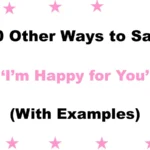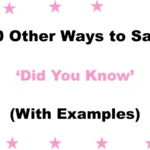Finding the right words to express how you feel about an opportunity can make all the difference. When you communicate with warmth and care, your message becomes more personal, genuine, and memorable. Saying you’re simply “excited about the opportunity” is common, but sometimes you want to add a bit more depth or variety to your expression.
Whether you’re writing a job application, responding to a new project, or sharing good news, having multiple ways to say the same thing can help you connect better with your audience. In this article, you’ll discover 30 thoughtful alternatives to say “excited about the opportunity,” each with explanations, examples, and advice on when and how to use them effectively.
What Does “Excited About the Opportunity” Mean?
The phrase “excited about the opportunity” means feeling enthusiastic, eager, or hopeful about a chance or possibility. It conveys positive anticipation and interest in what lies ahead, whether it’s a job, collaboration, or new experience. It’s a way to show you value what’s being offered and are motivated to engage.
When to Use “Excited About the Opportunity”
You can use this phrase when you want to express positive feelings about something new that’s available to you. This could be in professional settings like interviews, emails, or meetings, or in personal contexts when discussing new adventures or projects. It’s important to use this phrase when you want to highlight your eagerness and appreciation.
Is It Professional/Polite to Say “Excited About the Opportunity”?
Yes! Saying you’re “excited about the opportunity” is both professional and polite. It shows enthusiasm without being overly casual or pushy. However, depending on the context, some alternatives might feel more formal, friendly, or creative—so choosing the right version can enhance your message.
Pros and Cons of Saying “Excited About the Opportunity”
Pros:
- Shows positivity and eagerness
- Polite and respectful
- Commonly understood and clear
Cons:
- Can sound repetitive or generic if overused
- Might lack personal warmth or uniqueness
- Sometimes too formal or vague for casual situations
Synonyms for “Excited About the Opportunity”
- Thrilled to Be Considered
- Delighted About the Possibility
- Eager to Get Started
- Looking Forward to the Challenge
- Honored to Have This Chance
- Enthusiastic About the Prospect
- Overjoyed at the Opportunity
- Keen to Explore This Role
- Pumped About the Possibility
- Eagerly Awaiting the Next Steps
- Excited to Embark on This Journey
- Passionate About the Role
- Ready to Take on This Opportunity
- Grateful for the Chance
- Looking Ahead with Anticipation
- Inspired by This Possibility
- Delighted to Join the Team
- Motivated by This Challenge
- Thrilled to Contribute
- Over the Moon About the Role
- Fired Up for This Opportunity
- Enthralled by the Prospect
- Looking Forward to Collaborating
- Ready and Raring to Go
- Ecstatic About the Chance
- Inspired to Make a Difference
- Glad to Be Part of This
- Excited to Grow and Learn
- Hopeful About What’s Ahead
- Eager to Make an Impact
1. Thrilled to Be Considered
Definition: Feeling very happy and honored about being thought of for something.
Explanation: This phrase adds a stronger emotional tone than just “excited.” It implies delight and gratitude for being included.
Scenario Example: “I’m thrilled to be considered for this role and look forward to contributing.”
Best Use: Formal or semi-formal professional settings where you want to emphasize enthusiasm.
Worst Use: Very casual conversations where “thrilled” might seem too strong.
Tone: Warm, appreciative, enthusiastic.
2. Delighted About the Possibility
Definition: Feeling great pleasure and satisfaction regarding a potential opportunity.
Explanation: This phrase is polite and conveys a thoughtful excitement, emphasizing pleasure rather than just eagerness.
Scenario Example: “I’m delighted about the possibility of joining your team and collaborating.”
Best Use: Professional emails, formal conversations, or polite introductions.
Worst Use: Informal chats where it might feel too stiff.
Tone: Polite, positive, warm.
3. Eager to Get Started
Definition: Keen and enthusiastic to begin a new task or opportunity.
Explanation: Focuses on readiness and motivation to take action, showing proactive interest.
Scenario Example: “I’m eager to get started on this project and contribute my skills.”
Best Use: When you want to emphasize willingness and energy in professional or personal contexts.
Worst Use: Situations where patience or caution is preferred.
Tone: Energetic, proactive, sincere.
4. Looking Forward to the Challenge
Definition: Anticipating a task or opportunity with positive expectation, especially if it’s demanding.
Explanation: Shows that you welcome difficulties and growth, not just the opportunity itself.
Scenario Example: “I’m looking forward to the challenge this new role offers.”
Best Use: When facing new responsibilities or growth opportunities.
Worst Use: If the opportunity is simple or routine, this might sound odd.
Tone: Confident, optimistic, motivated.
5. Honored to Have This Chance
Definition: Feeling privileged and respected for being offered an opportunity.
Explanation: Highlights gratitude and respect, emphasizing the importance of the opportunity.
Scenario Example: “I am truly honored to have this chance to work with your esteemed company.”
Best Use: Formal or respectful situations, especially where hierarchy or prestige matters.
Worst Use: Casual or peer-level conversations where it may feel too formal.
Tone: Respectful, grateful, humble.
6. Enthusiastic About the Prospect
Definition: Showing strong interest and excitement about what might happen.
Explanation: More formal and intellectual, good for professional or thoughtful expressions.
Scenario Example: “I’m enthusiastic about the prospect of contributing to your innovative team.”
Best Use: Written communication or formal discussions in professional environments.
Worst Use: Informal or casual spoken conversations.
Tone: Professional, positive, engaged.
7. Overjoyed at the Opportunity
Definition: Feeling extremely happy and joyful about the chance given.
Explanation: This phrase expresses deep happiness, stronger than “excited.”
Scenario Example: “I am overjoyed at the opportunity to lead this project.”
Best Use: When you want to convey strong emotion in a heartfelt message.
Worst Use: Very casual or formal contexts where it might feel too dramatic.
Tone: Emotional, heartfelt, sincere.
8. Keen to Explore This Role
Definition: Showing a strong desire to learn more about and engage with the opportunity.
Explanation: Emphasizes curiosity and interest, good for situations involving new experiences.
Scenario Example: “I’m keen to explore this role and see how I can contribute.”
Best Use: When applying for jobs or new tasks that require learning.
Worst Use: If the situation requires immediate action rather than exploration.
Tone: Curious, engaged, positive.
9. Pumped About the Possibility
Definition: Very excited and energized about a potential opportunity.
Explanation: Informal and casual, suitable for relaxed conversations.
Scenario Example: “I’m pumped about the possibility of joining your team!”
Best Use: Friendly, informal discussions among peers or close colleagues.
Worst Use: Formal or professional emails or meetings.
Tone: Casual, energetic, enthusiastic.
10. Eagerly Awaiting the Next Steps
Definition: Looking forward with enthusiasm to what comes next.
Explanation: Shows patience combined with enthusiasm and readiness.
Scenario Example: “I am eagerly awaiting the next steps in the hiring process.”
Best Use: Follow-up communications in professional settings.
Worst Use: When you haven’t yet established a formal process.
Tone: Polite, hopeful, professional.
11. Excited to Embark on This Journey
Definition: Feeling eager and enthusiastic to begin a new experience or path.
Explanation: This phrase adds a narrative or story-like tone, suggesting that the opportunity is more than just a task—it’s a meaningful experience.
Scenario Example: “I’m excited to embark on this journey with your organization.”
Best Use: Great for transitions, new roles, long-term projects, or career moves.
Worst Use: Short-term or minor tasks—it may sound overly dramatic.
Tone: Inspirational, thoughtful, forward-looking.
12. Passionate About the Role
Definition: Deeply interested in and enthusiastic about a specific position or duty.
Explanation: It conveys commitment and emotional investment, rather than just surface-level excitement.
Scenario Example: “I’m truly passionate about the role and the values your company represents.”
Best Use: When you want to emphasize genuine alignment with the role’s mission or goals.
Worst Use: When you don’t yet know enough about the role to say it sincerely.
Tone: Sincere, heartfelt, dedicated.
13. Ready to Take on This Opportunity
Definition: Confident and prepared to begin working on a new challenge or project.
Explanation: Highlights readiness and capability alongside excitement.
Scenario Example: “I’m ready to take on this opportunity and give it my all.”
Best Use: When you want to show a balance of enthusiasm and professionalism.
Worst Use: Informal or casual messages—it might feel stiff.
Tone: Motivated, strong, positive.
14. Grateful for the Chance
Definition: Thankful and appreciative of the opportunity presented.
Explanation: Emphasizes humility and gratitude more than enthusiasm.
Scenario Example: “I’m truly grateful for the chance to be part of this team.”
Best Use: Polite or formal messages where showing appreciation matters.
Worst Use: Energetic or motivational moments where excitement is expected.
Tone: Humble, respectful, kind.
15. Looking Ahead with Anticipation
Definition: Looking forward to the future with a positive and hopeful mindset.
Explanation: Subtle and classy way to express excitement without overstating it.
Scenario Example: “I’m looking ahead with anticipation to all we’ll achieve together.”
Best Use: Emails, professional updates, or LinkedIn posts.
Worst Use: Extremely casual situations—it may feel too polished.
Tone: Polished, professional, composed.
16. Inspired by This Possibility
Definition: Mentally and emotionally stimulated by what the opportunity represents.
Explanation: This version adds a touch of creativity and personal motivation.
Scenario Example: “I’m inspired by this possibility and the impact it could have.”
Best Use: Vision-driven projects or organizations.
Worst Use: Basic tasks or roles—it could sound inflated.
Tone: Inspirational, thoughtful, reflective.
17. Delighted to Join the Team
Definition: Feeling pleased and happy to become part of a group or organization.
Explanation: Focuses more on the team aspect rather than the role itself.
Scenario Example: “I’m delighted to join the team and contribute my experience.”
Best Use: New hires, onboarding announcements, internal communications.
Worst Use: Applications where you’re not yet selected.
Tone: Warm, collaborative, friendly.
18. Motivated by This Challenge
Definition: Driven and inspired by the difficulty and growth potential of the opportunity.
Explanation: Conveys determination and a proactive mindset.
Scenario Example: “I’m motivated by this challenge and eager to make a difference.”
Best Use: When applying for leadership roles or problem-solving positions.
Worst Use: When the task is simple or routine.
Tone: Ambitious, courageous, energetic.
19. Thrilled to Contribute
Definition: Extremely happy about being able to add value or help.
Explanation: This phrase shows that you’re not just excited—you’re ready to support and give.
Scenario Example: “I’m thrilled to contribute to your company’s success.”
Best Use: Interviews, team introductions, or proposal letters.
Worst Use: When you’re still unsure how you’ll contribute.
Tone: Generous, enthusiastic, driven.
20. Over the Moon About the Role
Definition: Informal expression of extreme happiness and excitement.
Explanation: Adds a playful tone, especially in casual communication.
Scenario Example: “I’m over the moon about the role and can’t wait to get started!”
Best Use: Informal emails or conversations with a friendly tone.
Worst Use: Formal business settings—it may sound unprofessional.
Tone: Fun, joyful, relaxed.
21. Fired Up for This Opportunity
Definition: Feeling extremely enthusiastic and ready to act.
Explanation: Conveys high energy and determination.
Scenario Example: “I’m fired up for this opportunity and ready to hit the ground running.”
Best Use: Energetic job interviews or team meetings.
Worst Use: Conservative industries or formal contexts.
Tone: Bold, high-energy, motivational.
22. Enthralled by the Prospect
Definition: Deeply fascinated and captivated by the opportunity.
Explanation: A more literary or poetic way to say you’re excited.
Scenario Example: “I’m enthralled by the prospect of working with your innovative team.”
Best Use: Written statements, personal branding, or creative roles.
Worst Use: Very casual or spoken contexts—it may feel too dramatic.
Tone: Elegant, intellectual, creative.
23. Looking Forward to Collaborating
Definition: Anticipating positive outcomes through working with others.
Explanation: Focuses on teamwork and relationship-building.
Scenario Example: “I’m looking forward to collaborating with your talented team.”
Best Use: When emphasizing shared effort and partnership.
Worst Use: Solo roles or tasks without collaboration.
Tone: Cooperative, positive, team-oriented.
24. Ready and Raring to Go
Definition: Fully prepared and excited to begin.
Explanation: Informal and expressive phrase to show you’re full of energy.
Scenario Example: “I’m ready and raring to go—let’s make this a success!”
Best Use: Casual teams, startup culture, or enthusiastic leadership.
Worst Use: Formal applications or corporate meetings.
Tone: Energetic, upbeat, casual.
25. Ecstatic About the Chance
Definition: Extremely excited and joyful about the opportunity.
Explanation: Even stronger than “excited,” showing overwhelming happiness.
Scenario Example: “I’m ecstatic about the chance to be a part of this mission.”
Best Use: Big opportunities, personal announcements, or career shifts.
Worst Use: Formal emails—it might feel too emotional.
Tone: Emotional, joyful, expressive.
26. Inspired to Make a Difference
Definition: Feeling moved and motivated to contribute meaningfully.
Explanation: Suggests your excitement is rooted in purpose and values.
Scenario Example: “I’m inspired to make a difference through this opportunity.”
Best Use: Nonprofits, purpose-driven brands, or impact-driven roles.
Worst Use: Technical or routine roles where mission isn’t the focus.
Tone: Purposeful, thoughtful, values-driven.
27. Glad to Be Part of This
Definition: Feeling happy and content to be included or involved.
Explanation: Simple and warm, this phrase offers a more grounded expression of enthusiasm.
Scenario Example: “I’m glad to be part of this exciting phase for your company.”
Best Use: Team emails, informal updates, welcome messages.
Worst Use: Formal job applications or high-stakes proposals.
Tone: Friendly, relaxed, sincere.
28. Excited to Grow and Learn
Definition: Looking forward to personal or professional development.
Explanation: Shows humility and a growth mindset in addition to enthusiasm.
Scenario Example: “I’m excited to grow and learn through this opportunity.”
Best Use: Entry-level roles, career transitions, learning-focused environments.
Worst Use: Senior or leadership roles where growth might seem like inexperience.
Tone: Humble, optimistic, open-minded.
29. Hopeful About What’s Ahead
Definition: Feeling positive and optimistic about future outcomes.
Explanation: A subtle but sincere way to express forward-looking excitement.
Scenario Example: “I’m hopeful about what’s ahead and ready to contribute.”
Best Use: Reflective emails, transitions, or career shifts.
Worst Use: Places where stronger enthusiasm is expected.
Tone: Calm, thoughtful, quietly optimistic.
30. Eager to Make an Impact
Definition: Looking forward to making a real difference.
Explanation: Communicates enthusiasm that’s rooted in action and results.
Scenario Example: “I’m eager to make an impact and contribute meaningfully to the team.”
Best Use: Leadership roles, mission-driven work, team projects.
Worst Use: Passive roles with little room for initiative.
Tone: Purposeful, energetic, committed.
Final Thoughts
Using alternatives to “excited about the opportunity” helps your message stand out while expressing genuine emotion, professionalism, and thoughtfulness. Whether you want to sound polite, passionate, humble, or high-energy, these 30 alternatives give you the tools to express yourself in ways that connect. In a world where words matter more than ever, choosing the right tone makes all the difference.
FAQs
1. Why should I use alternatives to “Excited About the Opportunity”?
Using thoughtful alternatives helps your communication stand out and feel more genuine. Instead of sounding repetitive or generic, you show emotional intelligence, personality, and professionalism. This is especially useful in job interviews, emails, and team introductions where tone matters.
2. Is it unprofessional to say “Excited About the Opportunity”?
Not at all—it’s a perfectly polite and professional phrase. However, it’s become so common that it can sound overused. Using a more specific alternative shows intentionality and creativity, which can leave a stronger impression on your audience.
3. What’s the best way to choose which phrase to use?
Think about the tone, audience, and context. If it’s a formal job application, go with something like “Eager to Make an Impact” or “Looking Forward to Collaborating.” For more casual or friendly settings, “Over the Moon” or “Ready and Raring to Go” might work better. Choose what feels natural, sincere, and aligned with your voice.
4. Can these alternatives be used in cover letters for job interviews?
Yes! Most of the alternatives listed are versatile and professional enough for job applications, resumes, or interviews. Just make sure the phrase fits the tone of the company and accurately reflects your level of enthusiasm and readiness. For example, “Passionate About the Role” or “Inspired to Make a Difference” are great for formal settings.
5. How can I avoid sounding overly emotional or too formal?
Balance is key. Avoid going too far in either direction—phrases like “Ecstatic About the Chance” might be too emotional for conservative industries, while “Looking Ahead with Anticipation” might feel too reserved in dynamic, fast-paced fields. Test your phrase out loud and ask: Does this feel honest and appropriate for the situation?

Mia Rose is a passionate Language Coach and Contributor at GrammarPeaks, where she specializes in practical grammar tips and language learning strategies. With a strong foundation in education and communication, Mia brings a friendly, approachable style to her writing. Her goal is to make complex grammar rules simple and usable for learners at any level, helping them grow in both confidence and fluency.





